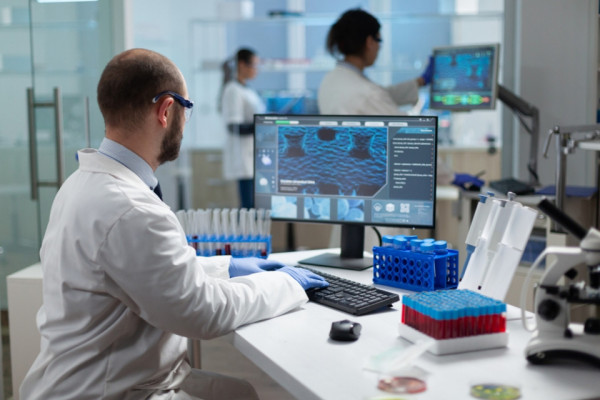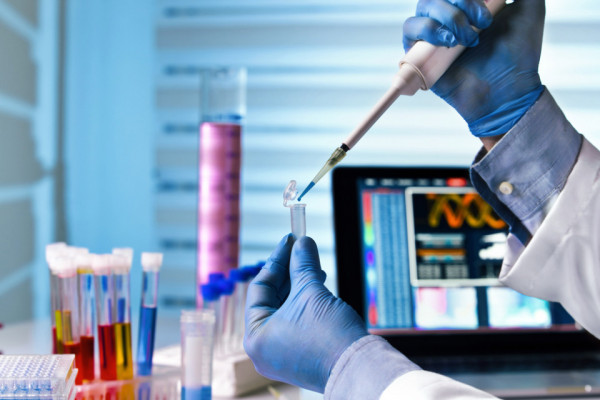
University of Bolton, Deane Road, Bolton. BL3 5AB
Tel:
Email:


“At the University of Bolton, we take great pride in providing a quality, supportive learning environment for our students.”
Professor George E Holmes DL | President & Vice Chancellor
“...tutors are very supportive and you’re not just a student ID number, at this university you are an individual with a name.”
Ellisse Vernon | BSc (Hons) Adult Nursing
Back to menu
Back to menu
Study with an Off-Campus Partner
Back to menu
Back to menu
University of Bolton, why we are the right choice
Location - Bolton, Greater Manchester

12/06/2023
Clinical biomedical scientists are unsung heroes in the huge arena of healthcare, a warzone of illnesses and disorders. They have an insatiable quest for knowledge and a sharp brain.
These scientists venture into the unknown territories of the human body. They investigate the complexities of our biology behind closed laboratory doors. They use leading-edge technology to discover the mysteries hidden within us.
In a world where technology advances with lightning speed, clinical biomedical scientists welcome the field's continuous change agents. They remain ahead of developing technology as they embrace new tools and procedures that improve their diagnostic skills. They use the power of innovation to open deeper levels of understanding. These include next-generation sequencing and improved imaging methods.
Prepare to be thrilled as you enter the world of clinical biomedical science. From illness diagnosis to DNA analysis, these modern-day magicians weave biology, technology and innovation together. Join us on an exciting adventure as we solve the enigma of what clinical biomedical scientists do.
What is Clinical Biomedicine?
Enter the realm of clinical biomedical science, where the secrets of the human body are revealed one by one. It's an intriguing area that combines biology and medicine.
This school of medicine enables clinical biomedical scientists to probe into human physiology's inner workings. Clinical biomedical science is the link between laboratory research and real-world medicinal applications and influences how we understand and treat illnesses.
Clinical biomedical science is an area that studies the complex link between biology and health. It includes a variety of scientific areas. Genetics and immunology are examples, as are molecular biology and biochemistry. Clinical biomedical science tries to understand the complicated processes behind diseases by merging these areas of knowledge.
Clinical biomedical scientists wear many hats. In the field of clinical biomedical science, they are detectives who work hard to solve medical riddles. They use a variety of laboratory techniques to dissect biological samples and analyse data to examine cellular processes. They do so to discover the underlying causes of illnesses.
This science is not limited to the sterile walls of the laboratory. Its impact is across the whole healthcare system. Clinical biomedical scientists work with healthcare practitioners. They share their experience and contribute to patient care. They act as the foundation of diagnostic laboratories and interpret test results to provide critical insights that influence medical decisions.
Clinical biomedical science is at the forefront of innovation in our era of fast technological progress. Scientists use state-of-the-art technology to uncover the secrets of human biology. These include next-generation sequencing and high-resolution imaging. These techniques help them to detect biomarkers and grasp the complexity of genetic illnesses. Overall, this approach helps them to design medicines that have the potential to transform healthcare.
What do Clinical Biomedical Scientists do?
Clinical biomedical scientists take the front stage in the enthralling world of healthcare. They embark on a scientific adventure unlike any other. But what do these superheroes do in the background?
The art of diagnosis is an important part of clinical biomedical science. They use their knowledge to identify illnesses and abnormalities. They analyse samples ranging from blood to tissue, armed with an array of technologies. In short, they look for hidden clues that might reveal our health's mysteries. Their sharp vision and deft hands are the guardians of accurate and fast diagnosis.
But their importance extends far beyond this. Precision medicine is a big part of clinical biomedical science. They use their extensive experience to customise therapies for each person. Clinical biomedical scientists determine the unique genetic composition of patients. They do so through genetic testing and molecular profiling. And they decode the genetic blueprints that cause illnesses. With this knowledge, they assist healthcare practitioners in selecting targeted treatments. Overall, they are the unsung heroes who are changing the way we approach medical treatment.
Collaboration is their hidden weapon. Clinical biomedical scientists collaborate with doctors, pathologists and researchers. They work together to share thoughts and discoveries that promote medical development. Their multidisciplinary approach encourages creativity. And they support the creation of innovative diagnostic tools and treatment techniques; including contributing to ground-breaking research projects.
As clinical biomedical scientists use the power of innovative tools, technology is their ally. They remain on top of technological advances, from improved imaging modalities to high-throughput genetic sequencing. They use these technologies to gain unique insights into human health. Their driving force is the connection between biology and technology. This allows them to understand the complexity of our bodies like never before.

Is a Biomedical Scientist a Doctor?
In the world of healthcare, a question often arises: Are clinical biomedical scientists doctors?
Clinical biomedical scientists, in contrast to medical doctors, focus on scientific research rather than clinical practice. They have vast expertise in biology, genetics and medical research. They help to make ground-breaking discoveries. Although they do not carry the title of "doctor," their contribution to patient care is significant. They bridge the gap between scientific information and clinical applications.
Clinical biomedical scientists work with physicians to provide insights and shape evidence-based therapies. Doctors provide direct care to patients whereas clinical biomedical scientists build the groundwork for future medical advances. It is critical to recognise the unique roles they play in medical advancement. So, while they may not be doctors in the traditional sense, their contributions are important for a healthier future.
Is Biomedical Scientist a Stressful Job?
In the captivating world of clinical biomedical science, one wonders: Is it a stressful job?
These intellectual soldiers face unique hurdles behind the scenes. Conducting difficult experiments and analysing data under deadlines may be stressful. Medical research may be an emotional rollercoaster, with highs and lows. As devotion and long hours are there, balancing work and home life can become difficult. But you could feel fulfilled in this profession because of the effect you can have on the world. Support within the scientific community and personal networks are critical in stress management. Collaboration, mentorship and open communication all contribute to a sense of togetherness.
In the end, whether being a clinical biomedical scientist is a difficult profession, is a matter of opinion. It necessitates a careful balance of zeal, perseverance and self-care. While the work has its own difficulties, for individuals who are curious and have a desire to make a difference, the rewards far exceed the stress. Clinical biomedical scientists pave the way for new medical advances, resulting in a brighter future.
 Do Biomedical Scientists Make Good Money?
Do Biomedical Scientists Make Good Money?
One hot issue often arises in the world of clinical biomedical science: Do clinical biomedical scientists make excellent money?
Let's look at the financial environment of clinical biomedical science and find out what's going on behind the pay check.
The earnings of clinical biomedical scientists, like that of many other occupations, can vary. Education, experience, specialisation and location all have a part in deciding their pay. Clinical biomedical scientists with a PhD and notable research experience often earn greater pay.
Furthermore, specialisation within the clinical biomedical science sector might impact income potential. Those that specialise in high-demand fields such as genetic research, drug development or biotechnology may earn higher-paying jobs. Working in famous research institutions or pharmaceutical businesses might also provide greater financial rewards.
Many clinical biomedical scientists make good money. But it's crucial to remember that this field is more about enthusiasm and the desire to improve scientific understanding. Many people like this field because they want to make a difference in people's lives.
But it is worth noting that clinical biomedical science involves hard hours, intense research and chasing grant money. You should compare the monetary rewards with the intrinsic fulfilment that comes from expanding the frontiers of scientific knowledge.
Biomedical Science Jobs in Greater Manchester:
Hospitals and medical centres in Greater Manchester welcome clinical biomedical scientists with open arms.
These facilities house laboratories built with progressive technology and instruments and provide an ideal setting for scientific study and discovery.
The job accessibility in Greater Manchester for clinical biomedical scientists is amazing. Whether you're interested in chemistry, haematology, histology or immunology, there's a role for you. Every day offers new challenges and possibilities to make a real contribution. You will get chances to perform laboratory tests to analyse samples and interpret data.
Clinical biomedical science jobs in Greater Manchester are all about collaboration. The region has an extensive network of research institutes and universities. They foster an environment of innovation and information sharing. You'll be part of a vibrant community that pushes the frontiers of scientific understanding. And you will do so while working alongside prominent researchers and fellow colleagues.
So, are you a fresh graduate looking to start your clinical biomedical science career? Or an experienced professional looking for new opportunities? Greater Manchester has the key to unlocking your career goals. This location welcomes clinical biomedical scientists to imprint on the forefront of healthcare and research. It offers them a plethora of opportunities, collaborative culture and an intriguing lifestyle.
Conclusion:
The enthralling world of clinical biomedical science offers limitless possibilities and prospects for people with a passion for knowledge and a desire to make a difference. At Bolton University, we commit to shaping the future of healthcare through our amazing program and dedicated faculty.
Consider joining Bolton University and starting a fulfilling career with fellow clinical biomedical scientists. Learn the secrets of the human body and contribute to pioneering research. Our amazing facilities and collaborative clinical biomedical science learning environment will provide you with the tools and support you need. Don't put off achieving your full potential.
To learn more about Bolton University's clinical biomedical science courses, contact us at enquiries@bolton.ac.uk or call +44 1204 903142 to speak to a member of the team. Start your journey towards a rewarding career right away and experience #UniAsItShouldBe!